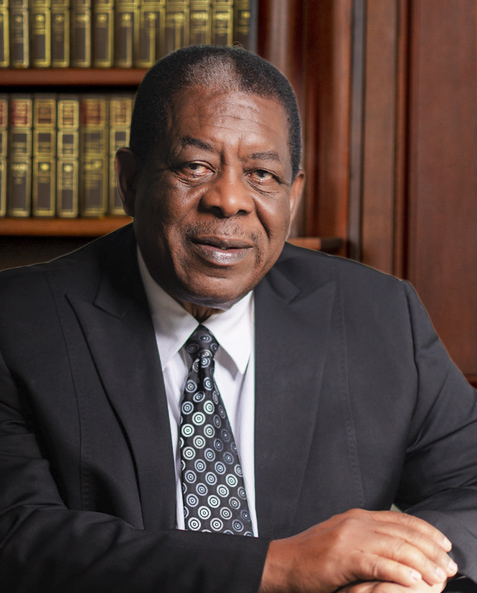Sir Dennis Byron
Sir Dennis Byron was President of the Caribbean Court of Justice (2011-2018), former Chief Justice of the Eastern Caribbean Supreme Court (1999-2009) and has been Chairman of the Commonwealth Judicial Education Institute in Halifax, Canada since 2000.
The Conference of Heads of Judiciaries of the Caribbean has described Sir Dennis as a judge of “amazing leadership and scholarship” who “has been a burst of talent, energy and stamina” and has made a “rich and sterling contribution to the jurisprudence of the Caribbean.”
His judicial career began in 1982, age 38, when he was appointed as a High Court Judge of the Eastern Caribbean Supreme Court. He was soon frequently sitting as a Court of Appeal Judge in an acting capacity before being appointed a substantive member of the Court of Appeal in 1990.
His 36 years of adjudication have bequeathed an unparalleled jurisprudential legacy. The president of the Organization of Commonwealth Caribbean Bar Associations described Sir Dennis as having a “sharp intellect” and being “a truly international legal icon”.
In 1986, he famously presided over the celebrated case of the Grenada 17 accused of assassinating Prime Minister Maurice Bishop of Grenada – the longest criminal trial in Caribbean history.

As Chief Justice of the Eastern Caribbean Supreme Court he launched the Judicial Education Institute, produced its Code of Ethics and was the first Chief Justice to implement the English-modelled Civil Procedure Rules in the Caribbean region. The President of the CCJ describes him as “a great judicial reformer” who had “boundless enthusiasm, indefatigable zeal, vision and bold leadership”.
Another colleague on the CCJ described him as leading “spectacular procedural and technological reforms to judicial systems, improving their accessibility and efficiency”.
His international work include judicial education programmes for the Haitian Judiciary (1995) and membership of a fact-finding mission to investigate abuses against the Rule of Law in Zimbabwe on behalf of the Human Rights Institute of the International Bar Association (2001).
At the invitation of Secretary General of the United Nations, Kofi Annan, he became a permanent Judge of the United Nations International Criminal Tribunal for Rwanda (ICTR) in 2004 and was elected President of the Tribunal in May 2007 and re-elected for a second term in May 2009 by his colleagues in recognition of his skills and competence. As President, he was required to present annual reports to the United Nations General Assembly.
Sir Dennis has written many publications and has been a keynote speaker and guest lecturer at renowned events and conferences across several continents, including the 9th Annual Ruth Steinkraus-Cohen International Law Lecture of the United Nations Association of London hosted by the School of Oriental and African Studies of the University of London.
He also holds the first Yogis & Keddy Chair in Human Rights Law at Dalhousie University.
In a recent interview with Radio Netherlands Worldwide, Sir Dennis highlighted two judgments of the ICTR as trend-setting in international law. Akayesu, which was the first case at the international level to interpret genocide in the light of the Genocide Convention and is also recognized as the seminal authority in international criminal law on sexual violence in conflict situations. As a result of this precedent, rape is now a crime of genocide. Secondly, President Byron highlighted the Media case which has identified the principles governing media responsibility in international criminal law.
Chief Justice of the Eastern Caribbean Supreme Court, Dame Janice Pereira, described Sir Dennis as “one of the greatest jurists from the CARICOM region and beyond, his legacy contained in a rich body of judicial pronouncements in every respect immortalized”.
Sir Dennis was recently biographed in Sir Dennis Byron: Law Legend by Dr. Francis Alexis.
